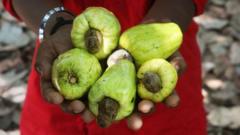As Ghana strives to increase its cashew processing capabilities, entrepreneurs like Mildred Akotia face hurdles due to high interest rates and competition from imported goods. Despite being the third-largest exporter of raw cashews, the country is missing out on lucrative revenue from processed nuts.
Ghana's Cashew Industry Struggles to Crack Domestic Market

Ghana's Cashew Industry Struggles to Crack Domestic Market
Ghana aims to transition from exporting raw cashews to enhancing local processing but faces significant challenges, including financing and market access.
Ghana is rich in cashew nut production, yet its potential remains largely untapped due to a lack of processing facilities and access to affordable financing. Roaming the streets of Accra, the capital of Ghana, one can find vendors selling roasted cashew nuts at significantly inflated prices compared to their raw counterparts sourced from local farmers. The striking 4,000% markup emphasizes the disconnect between the local agricultural sector and the retail market.
The nation ranks as the world's third-largest exporter of unprocessed cashews, trailing behind Ivory Coast and Cambodia. Approximately 300,000 Ghanaians depend on cashew farming for their livelihoods, but many, like farmer Nashiru Seydou, grapple with instability brought on by unpredictable supply chains and fluctuating wholesale prices. Seydou notes receiving about $50 for 100kg of unshelled cashews, while roasters and retailers reap profits between $20,000 and $40,000 per tonne once the nuts are processed and packaged.
Ghana produces roughly 180,000 tonnes of cashews annually, with over 80% exported in raw form, generating $300 million in revenues. However, this limits the country's ability to access higher profit margins associated with processed products. Efforts to bolster local cashew processing are being led by entrepreneurs such as Mildred Akotia, founder of Akwaaba Fine Foods, which currently processes a mere 25 tonnes annually. Akotia highlights the challenges posed by high-interest rates on loans, often at an unsustainable 30%, preventing the necessary investment in modern machinery.
Despite local processing initiatives, many cashews are exported to countries like India and Vietnam for processing, only to be imported back to Ghana at prices competitive with locally sourced cashews. This systemic issue leads to a contradiction where homegrown products are outpriced by processed imports.
Past government efforts to ban the export of raw cashews, aimed at stimulating local processing, faced strong backlash, leading to a quick reversal. Recent discussions on increasing tariffs on raw exports aim to protect local farmers, but experts argue that more foundational business development is needed. To thrive, local cashew businesses must scale operations and broaden consumer interest beyond a small middle-class segment.
Economist Prof. Daron Acemoglu emphasizes enhancing international market access for Ghana's processed cashews through improvements in infrastructure and workforce skills. However, Bright Simons, another local economic commentator, stresses that cultivating a local consumer base for cashews is equally important. Many entrepreneurs find themselves migrating abroad for better opportunities, exacerbating a 'brain drain' that hampers Ghana's economic growth.
Akotia remains optimistic and seeks to carve a niche in the cashew market. "I have calls from the UAE, Canada, and America. Currently, we can't meet demand," she states, envisioning her business through local processing initiatives. Her ambition reflects a broader hope: to provide a facelift to Ghanaian processed goods while creating jobs and bolstering the local economy.




















